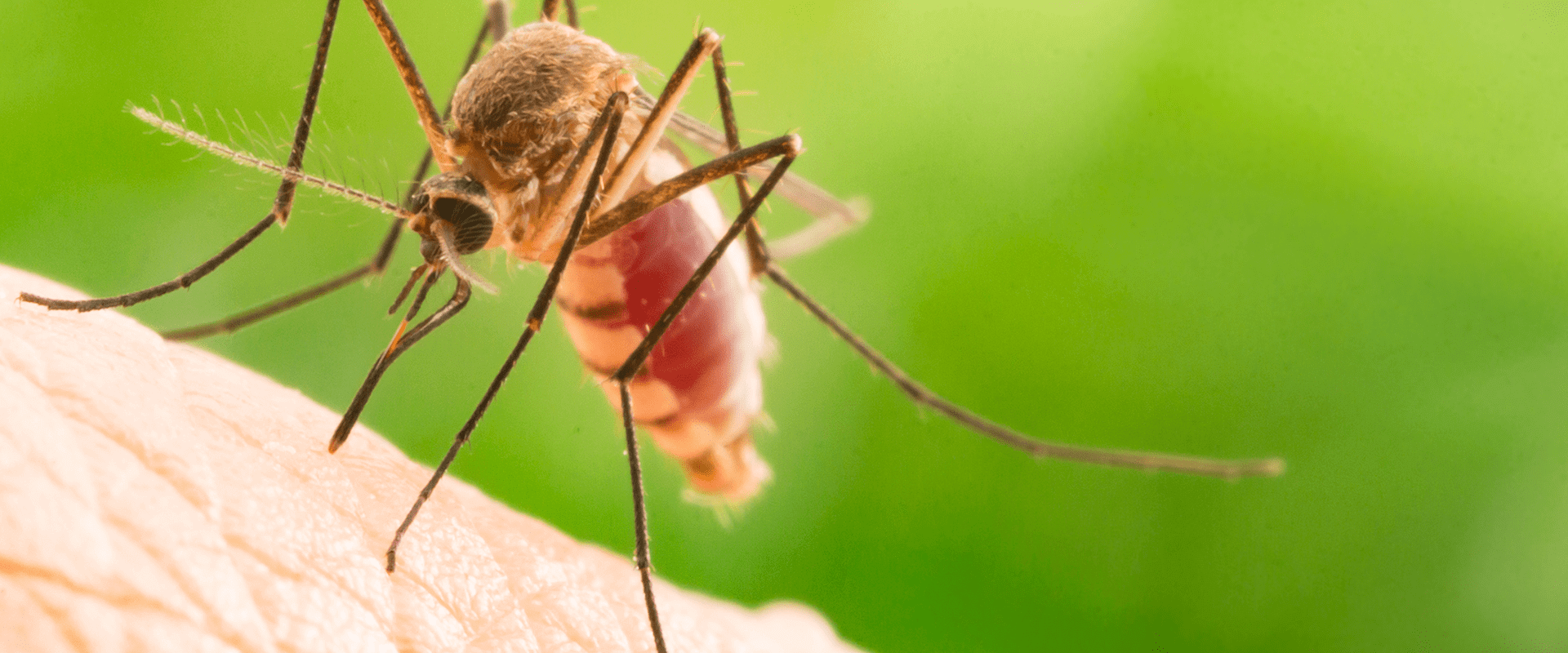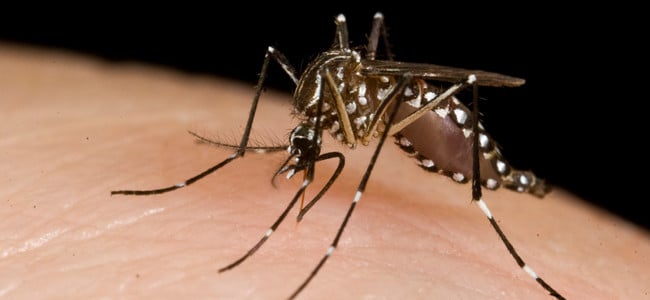How Dangerous Are Maryland Mosquito Bites?

We’ve all experienced the annoyance that is the mosquito. Unless you live in an area where it is cold year-round- and we all know that’s not what Maryland is like- mosquitoes have been a part of your life.
They swarm around you when you go to any wooded location, make eating dinner outside nearly impossible, and can ruin an outdoor event in no time at all.
Although everyone knows how annoying mosquitoes can be, far fewer people are aware of the dangers they pose.
Are mosquitoes anything to worry about? Are they really dangerous or do people blow the threat of a mosquito bite out of proportion?
The following information should clear up any questions you might have about how dangerous it is to be bitten by a Maryland mosquito.
A Description Of Mosquitoes
Although you’d be hard-pressed to find a person who isn’t familiar with mosquitoes, they’re such small insects that you probably haven’t paid too much attention to what they actually look like.
Mosquitoes have long, thin, oval-shaped bodies. Their color can vary depending on the species of mosquito, but they often appear gray or brown.
Mosquitoes range in size from around ¼ to ½ an inch. They have two wings, six very thin, dangling legs, and two antennae.

Male antennae have a feathery appearance, while female antennae appear slightly less feathery and contain odor receptors to help find blood sources.
Male and female mosquitoes have different antennae adaptations because only female mosquitoes suck blood.
Both male and female mosquitoes eat sweet foods, such as honeydew, nectar, and plant sap.
However, the females require blood in order to reproduce because blood has a protein in it that allows female mosquitoes to lay their eggs.
So although it’s common for people to talk about “hungry mosquitoes” when they’re swarming around you, when mosquitoes bite, they’re not really looking for a meal in the traditional sense.
The most interesting part of the mosquito is its mouthparts.
Even though it looks and feels like you’ve been pierced just once from a mosquito bite, in actuality, mosquitoes have six long, thin mouthparts called stylets, and all six of them pierce your skin to suck your blood.
Do Mosquitoes Target Certain People?
The first thing to realize about mosquito bites is that anyone can get them and probably at some point in their life everyone will get at least one.
That said, mosquitoes do seem to have preferences when it comes to whom they bite.
You may have heard people joke that a particular person must be sweeter than everyone else because they always end up with far more mosquito bites than anyone else.
Although that’s not exactly the case, it’s not far off. Mosquitoes do prefer the blood of certain people.
It has been shown that the following people seem to be more attractive to mosquitoes:
⭐ Pregnant women.
⭐ People with Type O blood.
⭐ People who have been drinking alcohol.
⭐ People who are or just finished exercising.
⭐ People who are overweight.
⭐ People wearing dark colors.
⭐ People wearing floral-scented perfume or deodorant.
Although some of the reasons for these preferences are unknown, it is known that one of the ways that mosquitoes detect their targets is by the carbon dioxide their victims exhale.
This may be why pregnant women, people who have been exercising, and overweight people are more attractive to them.
People in these groups tend to breathe more heavily, thereby exhaling more carbon dioxide.
Mosquitoes are also drawn to certain colors and scents, which may explain why they target people wearing dark colors, people who have been drinking, and people wearing floral perfume.
How Dangerous Is It To Be Bitten By Maryland Mosquitoes?
Everyone knows how annoying it is to be bitten by a mosquito, but few people stop to worry or wonder about the dangers of being bitten by a Maryland mosquito.
Is it really that dangerous? Aren’t the illnesses associated with mosquito bites a problem in other places, but not in the United States?
The short answer to all of these questions is that mosquitoes can be dangerous, even in Maryland. However, that’s not a complete answer, so let’s dive into more of the specifics.
Worldwide, the mosquito is the most dangerous and deadly animal alive. Although it seems hard to believe that something so small could be so dangerous, the fact is that over one million people die every year due to illnesses they contract from a mosquito bite.
Malaria is responsible for the majority of these deaths.
Although a couple of thousand cases of malaria are diagnosed in the United States each year, the vast majority of these cases can be traced back to travel in a country where malaria transmission occurs.
However, that doesn’t mean that living in Maryland means you’re out of the woods when it comes to the dangers of mosquito bites.
Although you probably don’t have to worry about malaria unless you’re doing some international travel, there are several diseases in the United States that mosquitoes transmit and that can be serious or even fatal.
West Nile virus is the most commonly contracted mosquito-borne disease in the United States. Most people who get it won’t even realize they have it.
Those who do typically have mild symptoms that include fever, headache, and body aches. These symptoms usually appear anywhere from three days to two weeks after being infected.
In less than 1% of the cases of the West Nile virus, people develop severe symptoms.
These symptoms can include muscle weakness, seizures, paralysis, coma, or in even rarer cases, death.
Chikungunya is a rare, but serious disease spread by mosquitoes. Most people who contract it end up with symptoms, the most common of which are fever and joint pain.
These usually resolve within a week, but the joint pain can continue for months in some cases. Although death from chikungunya is rare, this disease can be serious and debilitating.
The good news is that if you contract it, you are unlikely to end up with it again.
The Zika virus caused quite a scare several years ago. Although it’s rare in the United States, we still hear of reported cases each year.
For the vast majority of people, the Zika virus results in mild symptoms or no symptoms at all.
If one does experience symptoms, they include fever, muscle aches, headaches, and a rash. However, the real danger of the Zika virus is to the babies of pregnant women.
If a woman who is pregnant contracts the Zika virus, her unborn baby can end up with severe brain-related birth defects.
Eastern equine encephalitis is another rare but serious disease spread by mosquitoes. The danger of this disease is that it often results in neurological symptoms that can lead to death.
In fact, of all the people who end up with encephalitis due to this virus, about one-third of them will die. Symptoms of Eastern equine encephalitis include fever, malaise, muscle aches, and more.
If the virus affects the neurological system, it can cause symptoms like vomiting, seizures, and behavioral changes.
How To Reduce The Factors That Attract Mosquitoes
Once you understand the risk factors that come along with mosquito bites, it makes sense that you’ll be even more motivated to avoid them.
Reducing the factors that attract mosquitoes, both around yourself and around your property, can help you avoid mosquito bites and the diseases that these bites can transmit.
The following tips can help you become less attractive to mosquitoes.
⭐ While outside, wear light-colored clothing.
⭐ Avoid drinking alcohol if you’re planning to spend time outdoors.
⭐ Avoid spending time outdoors during the hours of dawn and dusk, since these are the times when mosquitoes are most active.
⭐ Wear a repellent with DEET when you have to be outside.
⭐ Wear long sleeves and pants if you have to spend time in an area with a lot of mosquito activity.
⭐ Remove areas of standing water on your property since these areas are where mosquitoes breed.
⭐ Keep the grass on your lawn trimmed low.
⭐ Consider planting shrubs and other plants that mosquitoes don’t like, such as marigolds or lavender.
How To Keep Mosquito Populations Low On Your Maryland Property
Taking preventative measures to avoid attracting mosquitoes is a good place to start when you want to avoid mosquito bites and the potential for illness.
However, most of the suggestions above will do nothing to actually remove mosquitoes from your property.
If you are serious about avoiding the problems associated with mosquitoes, you’re going to have to take action that involves keeping the mosquito populations low on your Maryland property.
In order to reduce the number of mosquitoes on your property, you have to do two things:
⭐ You have to eliminate as many adult mosquitoes as possible on your property.
⭐ You have to eliminate as many breeding areas on your property as possible.
By doing these two things, you can get rid of most of the mature mosquitoes on your Maryland lawn while also making sure that new mosquitoes aren’t hatching and developing into a future problem.
But how do you accomplish these two goals?
You can help prevent mosquitoes from breeding on your property by eliminating as many areas of standing water as possible.
This includes dumping out buckets, toys, or other items that collect water when it rains, keeping your gutters cleared of debris so they can’t clog, and ensuring that your home and lawn have proper drainage installed.
However, taking these actions doesn’t solve the problem of adult mosquitoes on your property.
It also doesn’t take care of standing water that can’t be removed from your property. In order to take care of these problems, the best course of action is to contact the professionals at American Pest.
At American Pest, we have nearly 100 years of experience solving Maryland’s pest problems.
For mosquito control, we have perfected a three-step solution to protect your property from dangerous mosquitoes.
1. First, we inspect your property to identify the areas where mosquitoes breed and where adult mosquitoes live and spend their time during the day.
2. We then use a specialized misting system to treat your yard, paying careful attention to the areas where mosquitoes are most likely to rest and hide.
3. Finally, we treat the areas around your property where mosquitoes are most likely to breed.
Our mosquito control is a monthly service that is performed during peak mosquito season, which typically runs from April through September.
By providing you with monthly treatments, we can make sure that we greatly reduce the mosquito population on your Maryland property to protect the health of your family all season long.
We also offer one-time mosquito control treatments for special events.
If you have an outdoor event coming up, such as a graduation party, wedding, or cookout, and want to keep your guests comfortable and safe, contact us. We’ll visit your property prior to the event to treat it and make sure the mosquito population is low on the day of the event.
For all your mosquito control needs, you can trust American Pest to keep your family happy and healthy. Contact us to schedule a service.
Request Your Pest Control Estimate
Related Posts
Contact Us Today!
Do you need an estimate for service or have questions about pests? We’d love to hear from you!
Fill out the form and receive feedback today. For immediate service, please give us a call!
